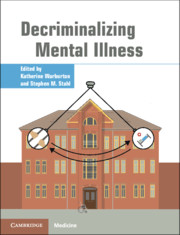Book contents
- Decriminalizing Mental Illness
- Decriminalizing Mental Illness
- Copyright page
- Contents
- Contributors
- Part I Introduction/Description of the Problem
- Chapter 1 Balancing the Pendulum: Rethinking the Role of Institutionalization in the Treatment of Serious Mental Illness
- Chapter 2 Deinstitutionalization and Other Factors in the Criminalization of Persons with Serious Mental Illness and How it is Being Addressed
- Chapter 3 A Brief History of the Criminalization of Mental Illness
- Chapter 4 A Social History of Psychotic Illness
- Chapter 5 Forensic Patients in State Psychiatric Hospitals: 1999–2016
- Chapter 6 A Survey of National Trends in Psychiatric Patients Found Incompetent to Stand Trial: Reasons for the Reinstitutionalization of People with Serious Mental Illness in the United States
- Chapter 7 Forensic Psychiatry and Mental Health in Australia: An Overview
- Chapter 8 Community Forensic Psychiatric Services in England and Wales
- Chapter 9 A Longitudinal Description of Incompetent to Stand Trial Admissions to a State Hospital
- Part II Solutions
- Part III Psychopharmacological Treatment Considerations
- Part IV Nonpsychopharmacological Treatment Considerations
- Part V Criminal Justice and Social Considerations
- Index
- References
Chapter 6 - A Survey of National Trends in Psychiatric Patients Found Incompetent to Stand Trial: Reasons for the Reinstitutionalization of People with Serious Mental Illness in the United States
from Part I - Introduction/Description of the Problem
Published online by Cambridge University Press: 19 October 2021
- Decriminalizing Mental Illness
- Decriminalizing Mental Illness
- Copyright page
- Contents
- Contributors
- Part I Introduction/Description of the Problem
- Chapter 1 Balancing the Pendulum: Rethinking the Role of Institutionalization in the Treatment of Serious Mental Illness
- Chapter 2 Deinstitutionalization and Other Factors in the Criminalization of Persons with Serious Mental Illness and How it is Being Addressed
- Chapter 3 A Brief History of the Criminalization of Mental Illness
- Chapter 4 A Social History of Psychotic Illness
- Chapter 5 Forensic Patients in State Psychiatric Hospitals: 1999–2016
- Chapter 6 A Survey of National Trends in Psychiatric Patients Found Incompetent to Stand Trial: Reasons for the Reinstitutionalization of People with Serious Mental Illness in the United States
- Chapter 7 Forensic Psychiatry and Mental Health in Australia: An Overview
- Chapter 8 Community Forensic Psychiatric Services in England and Wales
- Chapter 9 A Longitudinal Description of Incompetent to Stand Trial Admissions to a State Hospital
- Part II Solutions
- Part III Psychopharmacological Treatment Considerations
- Part IV Nonpsychopharmacological Treatment Considerations
- Part V Criminal Justice and Social Considerations
- Index
- References
Summary
Recent information indicates that the number of forensic patients in state hospitals has been increasing, largely driven by an increase in patients referred as incompetent to stand trial (IST). The surge in referrals for the evaluation and restoration of patients found IST is taxing state hospital systems, as well as the jails that must care for these patients when state hospitals are unable to accommodate the increased referrals. Many state mental health authorities are facing litigation pressure to admit IST patients more quickly, raising concerns about overcrowding and reinstitutionalization. Little is known about these national trends of increasing IST populations, and even less is known about what is driving them. This survey was intended to broaden the understanding of IST population trends on a national level.
- Type
- Chapter
- Information
- Decriminalizing Mental Illness , pp. 53 - 59Publisher: Cambridge University PressPrint publication year: 2021

